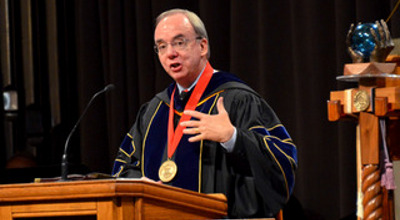Missionary’s Zeal Sparks Worldwide Kingdom Expansion
God is at work “in amazing ways” among people in the global South, thanks in large part to the efforts of people like Lottie Moon, Union University President David S. Dockery said recently.
“Over the last decades, we have seen the Spirit of God move with new emphasis and new opportunities, taking the gospel, extending and expanding the kingdom,” Dockery said. “We dare not miss this moment as an institution. We dare not miss this moment as Christ followers.”
Dockery addressed the university during its annual fall convocation, using Moon’s life as an example for how Christians should approach their responsibilities to live in a missional and kingdom-focused way. Moon died in 1912, so Dockery said the centennial of her death was a fitting occasion to look back upon her life and work as a missionary in China.
Moon was characterized by a gospel motivation, a scriptural foundation and a kingdom focus that fueled her missional calling, Dockery said. He noted that those foundational beliefs of Moon’s have largely been abandoned in the West but are being increasingly embraced by Christians in the East and the South.
A tiny woman physically at only 4-feet-3-inches, Dockery said Moon’s life was a foretaste of what is now happening in China. In 1910, two years before Moon’s death, 3,500 missionaries were living in China, which had about 300,000 believers. In 2010, China was a nation of 65 million Christians and sent out 20,000 missionaries itself.
By 2050, the nation is projected to have 183 million followers of Christ. Other nations—such as Brazil, Nigeria, Uganda, Ethiopia, India, South Korea and the Philippines—are seeing similar explosions in the influence of Christianity.
Moon was a serious student who was intellectually curious, Dockery said, At the same time, she was zealous for Christ and devoted to serving others. He told students that some institutions of higher education will encourage devotion to Christ but will downplay academic inquiry, while most schools will encourage students to pursue academics and to shun the gospel.
“At Union University, we do not see that you have to put away one or the other, but bring these two things together in the way Lottie Moon did in her life,” Dockery said.
The gospel—a belief in the divinity of Christ, his death on the cross and his resurrection from the dead—“must be the center of who we are,” Dockery said.
“Are we Christ-centered in a thorough-going way in all that we do in this place? Does the gospel have impact upon our classroom, upon our studies, upon our relationships?”
Moon’s scriptural foundation meant that she held to the Bible’s infallibility and inspiration by God, as well as its truthfulness and authority.
“We can neither reclaim nor advance the Christian intellectual tradition without a firm, foundational commitment to Scripture as God’s word, inspired, infallible, truthful and trustworthy,” Dockery said.
Moon also believed in the promise of God’s kingdom. While the kingdom of God has come in one sense, in another sense Christians are still waiting for its future consummation.
Dockery said that while the church is central to the work of God’s kingdom, it is not the extent of that kingdom, and Union students, faculty and staff must understand their labors as kingdom-focused work.
As her views about the gospel, Scripture and the kingdom of God fed Moon’s passion to devote her life to the cause of Christ, Dockery encouraged Union students to be similarly motivated. Living a missional life means practicing hospitality, demonstrating the gospel in all areas of life and serving others, whether in the same culture or cross-culturally, he said.
In a higher education institution like Union, Dockery said a missional mindset means not just prayer to begin class or a layer of piety of top of a secular education. It’s not just a community of caring people, or higher education in a Christian context, but education that’s focused on God’s kingdom.
“We need a vision for advancing the gospel and extending the kingdom in purposeful and intentional ways thought Christ-centered higher education,” he said.
That vision must be shaped by a scriptural foundation, conviction, kindness, cooperation and collaboration in all fields of study, Dockery said. Such a vision will result in students learning, listening, serving and worshipping in all contexts, whether locally or globally.














































